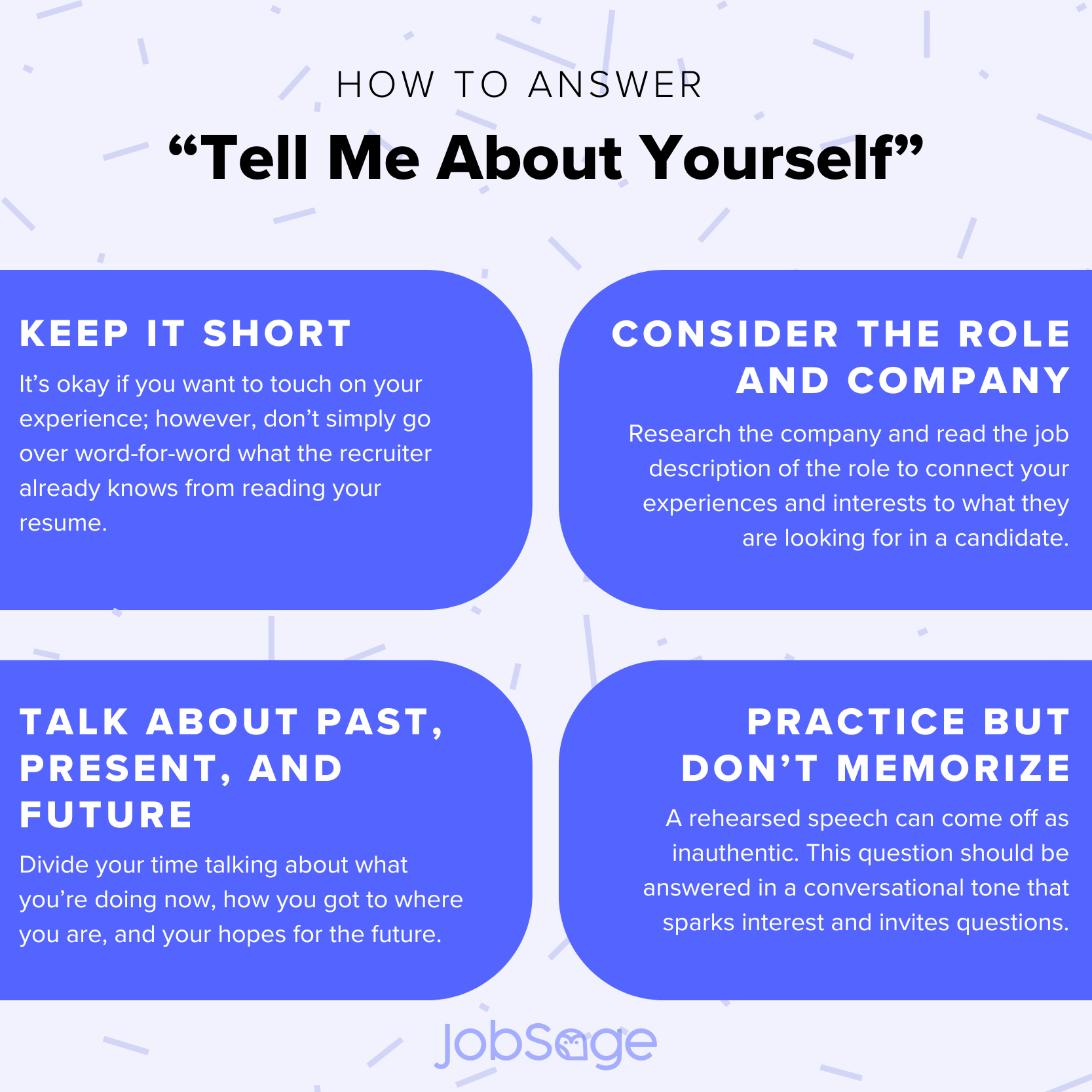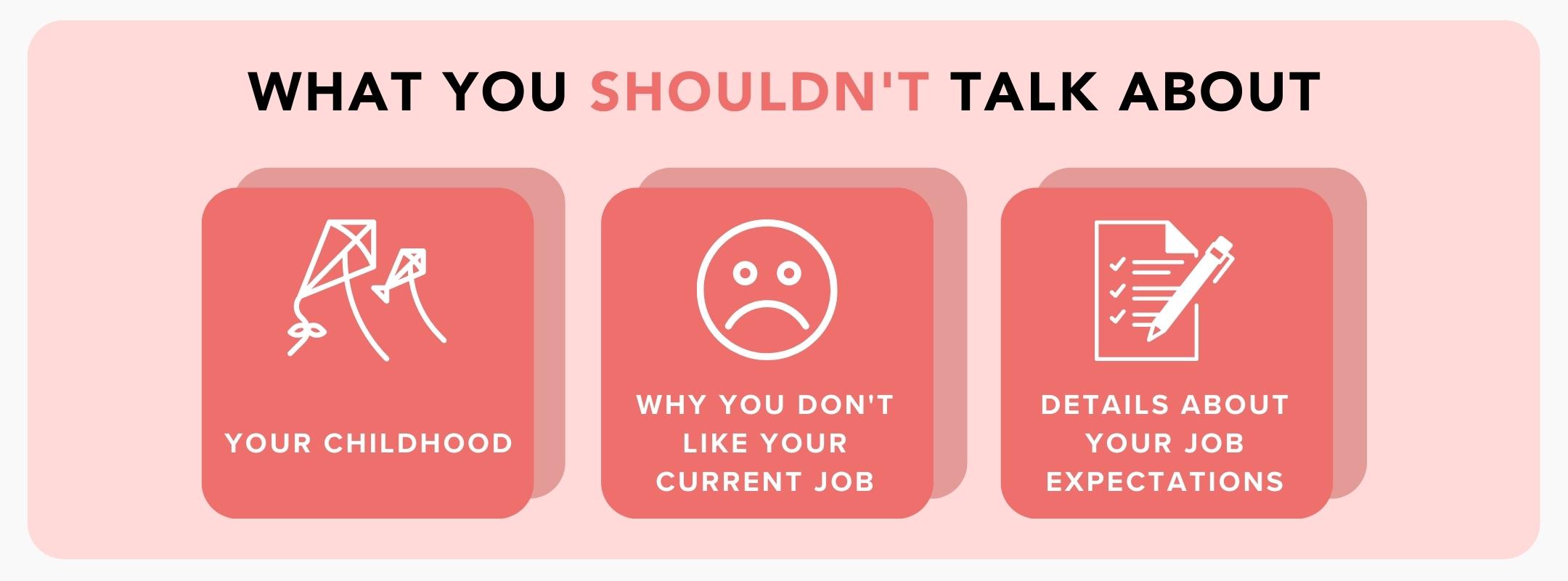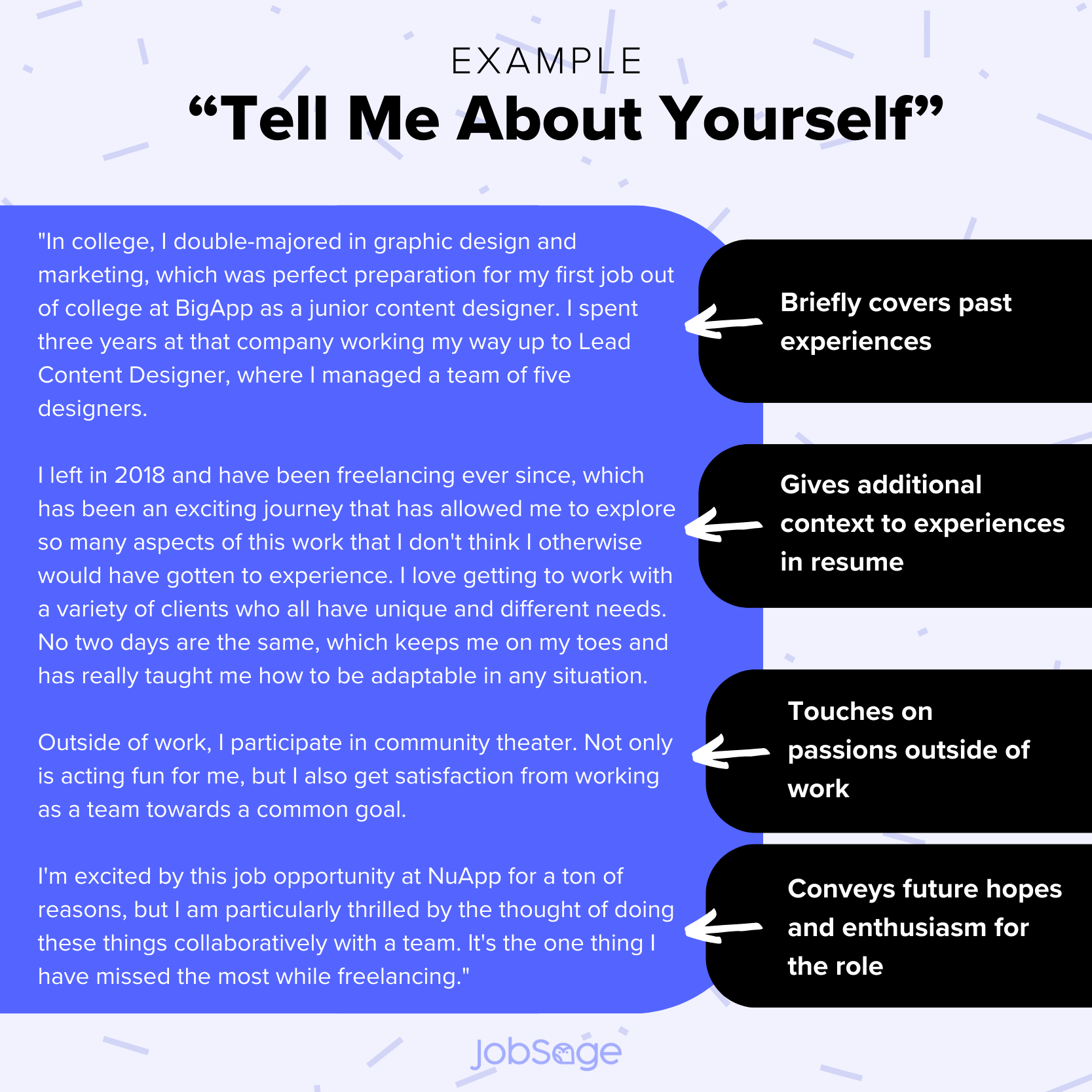One of the first questions you’ll probably get in a job interview is the one that makes many jobseekers the most nervous.
“Tell me about yourself!”
This seemingly easy open-ended interview question is among the most dreaded. Its ambiguous nature has the power to fluster the most confident interviewees and might leave you forgetting everything other than your name.
If this question makes you sweat, sit tight. We have some tips that can help you in your next interview.
Telling your story in a job interview
“Tell me about yourself” can be such a broad question and often leaves interviewees wondering what, exactly, employers want to know. Do they want a recap of your education? Do they want you to dive into your work history? Are they curious about your passions or what you love to do for fun?
Chances are, they want to know whatever it is that you think is important to talk about.
There’s no secret formula and interviewers aren’t waiting for you to say the magic words. Rather, this question is an opportunity for them to quickly get an overview of who you are.
RELATED: 6 Must-Do Management Interview Tips
What employers want to know about you
Interviewers typically ask this question to discover what parts of your personality and life you value and prioritize. Just as no two company cultures are the same, there is no one right answer to this question. Interviewers want to see whether your unique response will gel with their unique workplace culture.
And it’s not just your work history that employers care about. They want to know what drives you and what you’re passionate about day-to-day. All of these things help them better understand how you’ll fit in and add to the company.

How to answer “tell me about yourself”
While you want your response to be honest and true to you, you should still think about your answer ahead of time. Here are a few things to keep in mind when coming up with your answer.
1. Keep it short and don’t rehash your resume.
Keep your answer fairly general. The interviewer will likely ask you more in-depth questions throughout the interview, so there’s no need to get into the nitty-gritty of your experience. If there’s some aspect of your answer that they want you to expand upon, they will ask.
It’s okay if you want to touch on your experience; however, don’t rehash what the recruiter already knows from reading your resume. Instead, you can do some of the following:
- Connect how your past experience translates to the role that you’re applying for
- Discuss your passion for what you do and what inspires you about your line of work
- Talk about your hobbies and interests outside of work
- Touch on volunteer experience
- Let the interviewer know why you’re excited about the role or company
- Mention a few traits or skills that make you especially suited for the job
All of this will give the interviewer a holistic view of who you are as a person and job candidate.
2. Talk about your past, present, and future.
Divide your time talking about what you’re doing now, how you got to where you are, and your hopes for the future. You can start by mentioning your education and early roles and working your way up to the present, or you can start from the present and work backward. Either way, it’s good to end with your goals for the future and how you see the role fitting into that.
3. Think about the company and role that you are applying for.
While you don’t want to have completely different answers for each company or position that you’re applying for, it is something to be cognizant of when coming up with your answer.
For instance, if you were applying to a manager position, you may emphasize aspects of your story that reflect your leadership and management experience. Similarly, if you were applying for a position at an education-focused startup, you might touch on how you deeply value the education that you received.
Researching the company and reading the job description of the role you’re applying for will help you be able to connect your experiences and interests to what they are looking for in a candidate.
RELATED: How to Answer “What Do You Know About Our Company?”
4. Practice, but don’t memorize.
It can help to write down some bullet points and go over your answer a few times. Don’t memorize it, however. A rehearsed speech can cause your response to come off as inauthentic. This question should be answered in a conversational tone that sparks interest and invites questions.

What you shouldn’t talk about
We talked about a few things that you can talk about when answering this question, but what topics are off-limits?
Here are a few things that you should avoid talking about when answering this question.
1. Your childhood
Don’t treat your answer like an online recipe that requires you to scroll through a recap of an author’s childhood just to get to the good part. Unless you have a quick anecdote that is pertinent to your passion or career, there’s no need to give a play-by-play of your life story. Start with your education or relevant job experience.
2. Why you don’t like your current job
Don’t take this as an opportunity to rag on your current employer and list all the reasons why you’re looking to get out of there. You can say something along the lines of “I’m looking for more opportunities to grow my career” or “I hope to gain more experience in a different field with a new company” but don’t go beyond that.
3. Details about what you’re looking for in the job
This will likely be the first question an interviewer asks. Don’t go into detail about what you are looking for in the job, expected benefits, or desired salary. That can wait until later in the interview process.

“Tell me about yourself” examples
Here are some examples of an appropriate answer for this interview question.
Example 1
This example touches on past experience and describes where the candidate is currently in their career. They elaborate on why they love what they currently do and what they’ve gained from it. They then talk about a passion outside of work and tie it into why they are excited about this role.
“In college, I double-majored in graphic design and marketing, which was perfect preparation for my first job out of college at BigApp as a junior content designer. I spent three years at that company working my way up to Lead Content Designer, where I managed a team of five designers.
In 2018 I left the company and have been freelancing ever since, which has been an exciting journey that has allowed me to explore so many aspects of this work that I don’t think I otherwise would have gotten to experience. I love getting to work with a variety of clients who all have unique and different needs. No two days are the same, which keeps me on my toes and has really taught me how to be adaptable in any situation.
Outside of work, I participate in community theater. Not only is acting fun for me, but I also get satisfaction from working as a team towards a common goal. I’m excited by this job opportunity at NuApp for a ton of reasons, but I am particularly thrilled by the thought of doing these things collaboratively with a team. It’s the one thing I have missed the most while freelancing.”
Example 2
This example briefly covers past experiences, gives additional context to the candidates present situation, and touches on passions outside of work. It ends with the candidate conveying future hopes and enthusiasm for the role by connecting it to their passion.
“During college, I interned at Pen Inc. as a Content Marketing Intern where I developed my skills as a writer and fell in love with the craft. After graduating, they offered me a full-time position as a Content Marketing Manager.
Since then, I’ve been mentored by their Head of SEO. Under his guidance, I’ve worked on several large content projects, one of which led to $50k— and still counting— in sales, which has been something I’m really proud of.
I’ve also been taking on some pro-bono marketing work for my favorite non-profit, BikeOn. With them, I’ve run three successful digital marketing campaigns. It has been really great to combine my passion for the outdoors and mountain biking with marketing!
I feel that these experiences have led me to the next step: applying to Green Wave. I’m excited to take on new responsibilities as an SEO manager and utilize the things I’ve learned over the past three years. It is also exciting to apply to a company that values nature just as much as I do!”
Take a deep breath and be yourself
This is the time to let your personality shine. While you want to be professional, be yourself and talk about the aspects of your life and career that are most important to you.
Take a deep breath. You got this!
